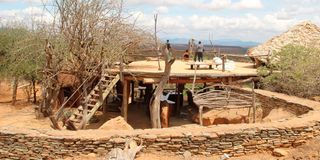How carbon credits cash is changing pastoralists’ lives

The Tasia Lodge in Lekurruki conservancy has been built using carbon credit cash.
Listening to members of the pastoralist communities in Isiolo and Laikipia counties speak about carbon credit sales draws one’s attention to the ongoing climate change conference in Sharm el-Sheikh, Egypt.
As environmental experts deliberate on how to reduce carbon emissions into the atmosphere to mitigate the effects of climate change, these communities are taking action and reaping handsomely. By adopting climate-smart practices in pasture management, they have earned a fortune and are living off carbon credit sales, literally.
The pastoralists are participating in the Northern Kenya Rangelands Carbon Project (NKRCP), which is one of the world’s largest soil carbon removal initiatives for rangelands restoration and community-based development.
The project is being implemented by the Northern Rangelands Trust (NRT) in 14 community conservancies, which earned $4.5 million (Sh512.5 million) this year from the sale of carbon credits. Each conservancy received Sh36 million.
NKRCP works with herders and combines traditional and modern ways of grazing livestock to restore grasslands so that they capture more carbon from the atmosphere, with the credits sold on the global carbon market.
Using this cash, members of the communities are building roads and dispensaries, drilling boreholes and establishing long-term businesses such as eco-lodges.
Lives transformed
A tour of the conservancies revealed how the carbon credit cash has transformed the lives of residents with the promise of solving issues of insecurity and fighting for resources among the pastoralists.
According to Mr Thomas Sakui, the grazing coordinator at Lekurruki conservancy in Laikipia County, the community divided the area into six grazing blocks of 2,000 acres each where they practise rotational grazing.
“There are community committees that assist in the implementation of the grazing plans,” he says. “When we have more vegetation on our land, the more carbon we absorb from the atmosphere and this is how we help in its reduction. Our conservation efforts have also seen a rise in the water table and we have noticed that our wells don’t dry up during dry seasons.”
The community spent Sh8 million to drill a borehole and water distribution infrastructure, said Mr Simon Njalis, the conservancy manager.
“We used to buy water from Isiolo, with a bowser costing Sh20,000. Each month, we would spend more than Sh100,000 on water; the borehole will save us over Sh1 million yearly. This money will be used for other community development projects,” he said.
Ms Jane Kilpan, a resident, said: “We are happy that now we don’t go for long distances to fetch water for our animals and domestic use.”
Before the communities started earning from the carbon credits, it took years of validation, with the methodology subjected to review at the international level, said Mr Mohamed Shibia, NRT director in charge of rangelands policy and strategy.
According to estimates, over 205,000 people are benefiting from the project as it promotes the protection of endangered wildlife species, including the black rhino, grevy’s zebra and the reticulated giraffe, since the funding is also used for conservation and restoration of rangelands.
“Our people didn’t know what carbon was, we don’t have a word for it in our local language but now we have created awareness. We are now aware that practising planned grazing is not only good for our livestock but also earns money,” said Mr Andrew Dokhole, a member of the carbon project oversight committee.
Ms Priscilla Kushi, the carbon project officer said: “Improved grazing management through rotational grazing across the conservancies has led to improved pasture for livestock and wildlife. ”
Using the carbon credit cash, members of the community have also built boarding schools for their children, which has improved retention.
Mr Andrew Phitisa, Nasuulu community conservancy manager in Isiolo, said they spent Sh5 million to refurbish a community school that takes care of children when their parents migrate in search of pasture and water.
“This school is restoring the dreams of these children because we are paying bursaries for the children and have provided boarding facilities. Some children had dropped out of school and with the high rate of early marriages this problem has been solved,” Mr Phitisa said.





